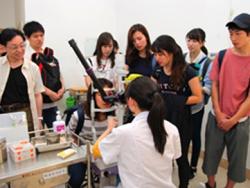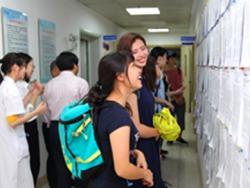International and Domestic exchange
Yukiko Shinohara (2nd year student)
After completing my study abroad at Shantou University in China
I studied abroad at Shantou University in China from November 11th to November 18th, 2017. I decided to participate because I heard from a senior who had participated in this study abroad program that it would be a very interesting and valuable experience. I had never been to China before, so I was a little nervous, but I was able to have many experiences that I would not have been able to have in Japan, and I am really glad that I was able to participate in this program.
On the first day, we gathered at Kansai International Airport and boarded the plane that took off at 9:00. We arrived in Shantou at 17:00, a little later than scheduled. The time difference with Shantou was about one hour, so there was no jet lag. We traveled by bus from the airport in Shantou to the hotel where we were staying. China's transportation is not as well organized as Japan's, and there is no concept of distance between cars. I was worried many times that we might collide until we arrived at the hotel. At the hotel, the chairman of the Li Ka Shing Foundation and the other teachers who would be taking care of us for the next week were there. All of the teachers had been to Japan before, so they were fluent in Japanese and we did not encounter any language barriers. At the welcome dinner, we were all surprised by the Chinese food, which tasted completely different from the Chinese food we usually eat. The hotel room was very clean and amazing.
On the second day, I participated in volunteer activities in rural areas. I saw second-year students from Shantou University getting off the minibus one after another, and I thought it was very conscious of them to be interested in volunteering as second-year students. The Department of Nursing students were taking blood pressure and taking tests on children's weight, color vision, and eyesight. I was surprised that they were already interacting with patients, even though they were also second-year students. Although they sometimes go to nursing homes as volunteers, I was envious that they were able to participate in practical training including practical content at such an early stage. The School of Medicine students sat next to the volunteering teachers and listened to their talks. I was surprised because this was also a sight I had never seen in Japan. The most memorable thing that day was the story of the nursing students. He said that he wanted to be a doctor in America, and the reason he didn't want to be a doctor in China was because there were many doctors who were killed by patients or their families. I had never heard of a doctor being killed by a patient or a patient's family in Japan, so I felt that there were differences in how doctors were treated depending on the country, and it made me think about the role of doctors in Japan.
On the third day, we visited the Shantou University Graduate School, the Shantou University campus, and the Oncology and Cancer Center. The Shantou University Graduate School was like a joint research center with Hyogo Medical University. Not only was the flow cytometer used in the practical training installed, but a next-generation sequencer worth hundreds of millions was also installed, and I was surprised at the financial resources available to purchase expensive experimental equipment. At the Oncology and Cancer Center, which we visited next, there was a treatment device called True Beam, which also costs hundreds of millions. It seems that this True Beam was the first in Asia to be installed here. To be honest, I was surprised that such amazing equipment was available in Shantou, not in a big city like Beijing. Next, we went to Shantou University. Shantou University is a comprehensive university, and the School of Medicine building was shaped like the letter O. I was surprised not only by the size of the campus, but also by the facility called the Human Life Science Museum, which has many models, and the quality of the practical equipment. The Human Life Science Museum had many models that would be questionable for installation from an ethical point of view in Japan, and I felt the difference in ethics. That day, we had dinner at the International Exchange Center, a hotel-like facility that also houses accommodation for international students. It was truly beautiful, and I felt truly blessed to have such a facility on campus.
On the fourth day, I accompanied the doctor on a home visit. The family we visited had a very friendly atmosphere, even offering chairs for us, but when the doctor began his interview, the wife suddenly burst into tears. We were all surprised, as we had never encountered such a scene before. It reaffirmed to us that being involved in the medical field means being present at such scenes. When prescribing medicine, I was surprised that the highly toxic drug morphine was given as a matter of course. Also, the names of drugs I had learned about in Department of Pharmacology this summer, such as codeine, morphine, and omeprazole, came up, so it was good that I had studied them.
On the fifth day, I took two hours to visit an ophthalmologist. It was more rural than I expected, and I was impressed by the fact that the roads were not paved. The ophthalmologist had a large number of outpatients, and I heard that a female doctor named Dr. Chou performed three or four cataract surgeries in the morning alone. She said that cataract surgery is delicate and more mentally exhausting than physically, so she wanted to pass the baton to a younger doctor soon. I heard that surgery on one eye costs 30,000 yen at Hyogo Medical University, but in China it costs 35,000 yen including both eyes and medicine, so I thought the support was excellent.
On the sixth day, the most memorable visit was to the NICU. The babies were so tiny, and I was impressed that they were moving. I was impressed that they were alive even though they were so tiny, and the vitality of the babies and the medical care that can make them live even though they are so small. Next, I visited a plastic surgery department specializing in cleft lip and palate. I was surprised to learn that there is a department that specializes in cleft lip and palate. Apparently, cleft lip and palate used to be treated by surgeons, but with medical advances, it became possible to treat them earlier, so a specialized department was established. I learned for the first time that cleft lip and palate is thought to be caused by genes. I think that if the causative gene is identified, the number of cleft lip and palate patients will decrease dramatically. Therefore, I hope that the causative gene will be discovered soon.
On the seventh day, I went to the obstetrics and gynecology department. Obstetrics and gynecology deals with delicate issues such as pregnancy for women, but unlike in Japan, obstetrics and gynecology departments in China have doors left open and there are other patients right behind them, giving no sense of privacy. Women tend to overthink things at obstetrics and gynecology departments, and it can sometimes be too late to treat them, so I thought this open style would be an opportunity for women to learn that other people are suffering in the same way. That night, I had homemade dumplings made from scratch. They were very delicious and I enjoyed my last night there.
I was able to have so many experiences during this study abroad program that I can't even begin to write them all down. I'm really glad that I was able to participate in this program.
Lastly, I would like to express my sincere gratitude to the professors at Hyogo Medical University of Medicine and the Li Ka Shing Foundation for giving me this opportunity, the professors at Shantou University and their families who showed me around despite their busy schedules, Professor Hattori who accompanied me, and everyone who participated in the program with me. Thank you very much.

